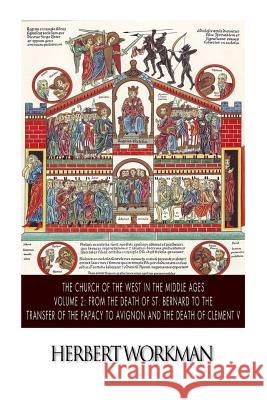The Church of the West in the Middle Ages Volume 2: From the Death of St. Bernard to the Transfer of the Papacy to Avignon and the Death of Clement V » książka
The Church of the West in the Middle Ages Volume 2: From the Death of St. Bernard to the Transfer of the Papacy to Avignon and the Death of Clement V
ISBN-13: 9781502950345 / Angielski / Miękka / 2014 / 180 str.
The Church of the West in the Middle Ages Volume 2: From the Death of St. Bernard to the Transfer of the Papacy to Avignon and the Death of Clement V
ISBN-13: 9781502950345 / Angielski / Miękka / 2014 / 180 str.
(netto: 28,55 VAT: 5%)
Najniższa cena z 30 dni: 29,98
ok. 16-18 dni roboczych
Bez gwarancji dostawy przed świętami
Darmowa dostawa!
This is a history of Christian Church in the centuries after the death of Christ, and the way in which it spread across Europe. From the preface: "IN this second and concluding volume I bring down the story of the Church of the West in the "Middle Ages" to the transfer of the Papacy to Avignon. History, as Freeman has taught us, is continuous, and all breaks are unreal. Nevertheless, the transfer of the Papacy marks the virtual close of the "Middle Ages," and the beginning of a new epoch. With this new chapter in the history of the Church of Christ I purpose dealing in a future study of the Reformation, using the word to indicate not merely the resultant, but the various divergent forces of which it was the outcome. For the Reformation that succeeded is one with, and can only be understood by its relation to the reformation that failed; Wyclif must not be isolated from Luther, nor Constance from Worms. But if further defence be needed for ending the "Middle Ages" with Avignon., I must refer the reader to what I have written. My object in this and other volumes will not be so much to give the details of events, -for this I shall refer the reader to suitable "Authorities,"-as to indicate the forces and tendencies, external and internal, whereby the Church has been moulded for good or evil. I write under the conviction that history is a progress and not a cycle, and that every generation contributes something to the spiritual heritage of mankind. Such progress involves the continuity of the one life of the Spirit manifesting Himself in different ways in different ages. Controversy, therefore, is far from my purpose. The business of the historian is to put his readers into the standpoint of the past; not to throw mud from the dunghills of pride. It does not become the heirs of all the ages to find nothing but blame for the centuries into whose labours they have entered, by whose mistakes they have profited. The Pharisee may stand in the porch of History as well as in the Temple of God."
Zawartość książki może nie spełniać oczekiwań – reklamacje nie obejmują treści, która mogła nie być redakcyjnie ani merytorycznie opracowana.











